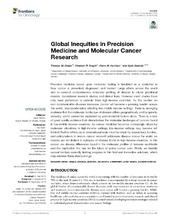| dc.description.abstract | Precision medicine based upon molecular testing is heralded as a revolution in how cancer is prevented, diagnosed, and treated. Large efforts across the world aim to conduct comprehensive molecular profiling of disease to inform preclinical models, translational research studies and clinical trials. However, most studies have only been performed in patients from high-income countries. As the burden on non-communicable diseases increases, cancer will become a pressing burden across the world, disproportionately affecting low-middle income settings. There is emerging evidence that the molecular landscape of disease differs geographically and by genetic ancestry, which cannot be explained by environmental factors alone. There is a lack of good quality evidence that characterises the molecular landscape of cancers found in low-middle income countries. As cancer medicine becomes increasingly driven by molecular alterations in high-income settings, low-income settings may become left behind. Further efforts on an international scale must be made by researchers, funders, and policymakers to ensure cancer research addresses disease across the world, so models are not limited to subtypes of disease found in high-income countries. In this review, we discuss differences found in the molecular profiles of tumours worldwide and the implication this has for the future of global cancer care. Finally, we identify several barriers currently limiting progress in this field and innovative solutions, which may address these shortcomings. | en_US |

